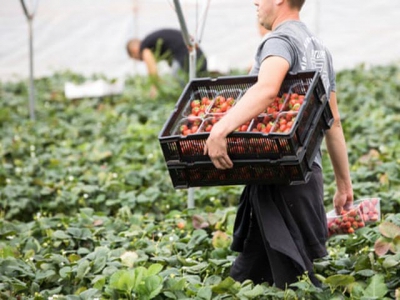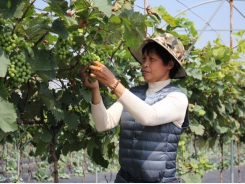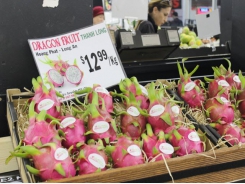All my friends went home: a fruit picker on life without EU workers

With fellow Europeans leaving the UK, and no British workers taking their place, Eleanor Popa’s job harvesting strawberries has gone from tough to tough and lonely. Will the farm survive another year?
A strawberry picker at a fruit farm in Hereford. Photo: Bloomberg/Getty Images
Eleanor Popa used to sleep in a six-berth caravan on the site of Sharrington Strawberries, a 16-hectare (40-acre) strawberry farm in Melton Constable, Norfolk. Now, there are only four people in her caravan: everyone else has left to work in EU countries. “My friends,” she says, “they went home, or to work in Spain and Germany. A lot of them did not come back to work this year.”
Popa, who is from Bulgaria, has been a fruit picker for two years. “It’s hard work,” she says. “We have to get up early and pick. It’s 6am in the summer. Now we get up at 7.30am. And we work in tunnels. Sometimes it’s cold, sometimes it’s hot. Sometimes it’s windy. It can be boring.” Picking strawberries is skilled work. “It took me a month to learn how to pick the fruit,” she says.
Because Sharrington Strawberries grows its fruit in the soil, which makes for a better product, pickers bend double, or squat, for most of their shift. (Many farms grow their strawberries on tabletops, which means they are easier to pick, but less flavourful.) Each strawberry is hand-picked: no one has yet developed a machine to pick strawberries.
Popa cuts through the calyx, the whorl of green, leafy material at the top of the fruit, being careful to keep it intact, otherwise the berry will quickly rot. “The quality is important here, and you need to go fast,” she says. Her supervisor directs her where to pick, and checks each strawberry for quality control.
Normally, she would work an eight-hour day, but now, owing to labour shortages at the farm, it’s often closer to 10. “You feel tired at the end,” she says. “Your back hurts. When it rains, it’s hard. And when it’s hot, it’s hard.” Popa has two children, a boy and a girl, and misses them dearly. But she stays, because “the money here is good”. It’s a solitary and often boring existence. In the evening, the farm workers play cards or watch TV in their caravans. Sometimes they go to the beach.
Popa’s boss, Simon Turner, 64, is at the end of his tether. “It’s horrendous,” he says. “Brexit has killed us. It’s going to destroy us. My business survived Covid, but I don’t think we’ll get over Brexit.”
Turner is working 20-hour days to try to stay on top of things. “I’ve been running this farm for 40 years,” he says, “and this is the worst it’s ever been.” The strain shows in his voice. “When you put your life’s work into building something from nothing,” he says, “for it to be destroyed by something beyond your control sucks.”
The issue is that Turner cannot recruit British workers, and EU citizens can’t get into the country. The pay is decent: Popa tells me that she earns between £2,000 and £2,500 a month, after tax, depending on how much she picks. But it’s backbreaking, exhausting work, and UK workers don’t want to do it. “It’s too hard,” says Turner. Last year, he recruited 88 British staff under the government-backed Pick for Britain campaign. “Most of them didn’t last three hours,” he says. “Imagine the paperwork, to put 88 people on the books.” Only two people stayed for more than a few days.
Turner has put up rates as much as he can, but the business is teetering on the brink of collapse. “We’ve probably lost 20% of our crop,” he says, “because we didn’t have the workers to pick it. If we lose much more we won’t be able to cope.” He is desperate for the government to allow EU workers to re-enter the UK. “These are good people and we pay them fairly,” Turner says. “But Brexit has made it so difficult that they don’t want to come.”
It is a similar picture nationwide. “Farm businesses have done all they can to recruit staff domestically,” says Tom Bradshaw, vice president of the National Farmers’ Union (NFU), “but even increasingly competitive wages have had little impact because the labour pool is so limited, instead only adding to growing production costs.” The government increased the seasonal workers pilot, which allows fruit pickers to enter the UK, by 30,000 places in December 2020, but many in the sector say it is not enough.
The NFU is calling for a short-term Covid recovery visa, alongside a permanent seasonal workers scheme. “It would be an effective and frankly vital route to help the pressing needs of the industry today,” says Bradshaw. Unless the government U-turns to permit these temporary visas for EU farm workers, Turner is looking at closing down his farm next year. “It may be that next year is our last year and we lose a ton of money,” he says.
And it’s likely that this year will be Popa’s last in the UK. “I will miss the UK,” she says. “It’s a nice country. The people are nice.” But all her friends are in Spain, or Germany, picking fruit, so she’s probably going to head there and join them next year. “It’s easier to travel there,” she says. “The documentation is easier, and the money is similar. And it’s closer to Bulgaria.”
Có thể bạn quan tâm
Phần mềm

Phối trộn thức ăn chăn nuôi

Pha dung dịch thủy canh

Định mức cho tôm ăn

Phối trộn phân bón NPK

Xác định tỷ lệ tôm sống

Chuyển đổi đơn vị phân bón

Xác định công suất sục khí

Chuyển đổi đơn vị tôm

Tính diện tích nhà kính

Tính thể tích ao hồ




 Aiming for the agricultural export turnover to Russia…
Aiming for the agricultural export turnover to Russia…  Vietnamese agricultural products record impressive exports
Vietnamese agricultural products record impressive exports